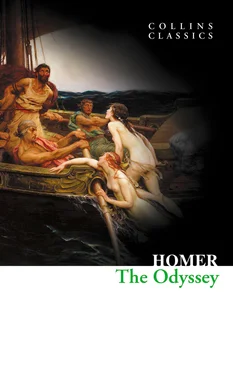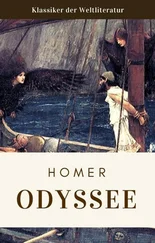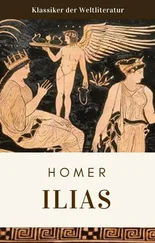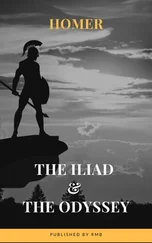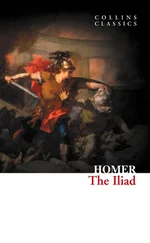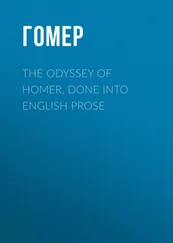‘Offer a prayer, O guest, to our lord Poseidon, upon whose feast you have chanced in visiting us now. And after you have made your drink-offering and prayed the due prayer, then pass the honeyed wine to this your friend, that he may offer: for I deem that he, like you, will wish to supplicate the eternal Gods, for lack of whom the hearts of all the world would go desolate. If I give the embossed cup to you, before him, it is only because he is younger, a man of my own generation.’
Thereupon he put the sweet wine into her hand: Athene was gladdened by the right instinct of the man, who had preferred her in serving the storied golden cup; and presently she uttered to kingly Poseidon all her desire in prayer.
‘Hear us, World-girdler, nor refuse, as greedy, our prayers for the gaining of our end. Entail upon Nestor, greatest of his line, as for the sons which follow after him, glory. Give to all in Pylos a bountiful return for these hundred victims they have so largely sacrificed. Grant further that when Telemachus and I go back, it may be with a happy issue to the purposes for which we have sailed here in our swift, black ship.’ So she prayed, and all the while was bringing her own prayer to pass. Then she gave the rich loving-cup to the dear son of Odysseus and he repeated her prayer.
By now the others had roasted the flesh-meat of the victims and drawn the gobbets off their spits. Portions were shared out to all: and they ate their fill of the noble spread. But when at last the appetites for food and drink had been relieved, to them Nestor, Gerenia’s knight, began to speak: –
‘When strangers are fully satisfied with food, as now, it is fair to make enquiry of them and find out who they are. Tell us therefore of yourselves, O guests! Where did your journey over the sea-ways begin? Is yours a business venture, or do you cruise at random like those pirates who quarter the salt waves and risk their souls to profit by what others lose?’
Telemachus was inspired to answer him bravely, being heartened thereto by Athene herself, who wished that he might acquire men’s respect through diligence in seeking news of his absent father. ‘O Nestor, Neleus’ son, chief glory of the Achaeans! You ask whence we come. I will make all plain. We are from Ithaca, that lies below Neion: and our motive, which I now set forth, is personal, not public. I cast about for trace of my father, a man of universal fame, the patient and mighty Odysseus. Rumour has it that in the sack of the Trojan capital he fought by your side. We can tally all the others who served at Troy; or mark just where each one died his grievous death: but Zeus has left the fate of this last man a mystery. No one can say for sure where he was lost – on the mainland, borne down by men who hated him, or in the deep, beneath the waves of Amphitrite.
‘Because of this I am suppliant at your knees, O Nestor: begging that you relate his pitiful death, as you saw it with your own eyes, or learned it from the lips of such another waif. His death, I say, for even from his mother’s womb calamity had marked him for her own. Do not in pity convey to me smooth things, things gentler than the truth: blurt out, rather, all that met your sight. I beseech you if (when you Achaeans were sore pressed by the men of Troy) my father, noble Odysseus, ever pledged himself to you and fulfilled his bond – that so you now have regard for me and give me the naked fact.’
Then answered him Nestor, knight of Gerenia. ‘Dear lad, since you recall to my mind those dreary memories, hear the tale of what we endured in that fatal land – we fierce, ill-disciplined Achaeans; and of what we endured while we strayed after booty over the misty face of the ocean wheresoever Achilles led: as also of our struggles about the great walled city of King Priam. There our bravest died. Aias, the lord of battles, lies there: Achilles himself: and Patroclus, whose wisdom at the council board was godlike. And there too died my lovely son, the strong, clean Antilochus, who was surpassingly swift-footed and a fighter. Ever so many evils we suffered beyond this count. Mortal frailty could not support the whole story, not though you tarried here for five years or six enquiring into all that the Achaean chivalry there lost. Before the end you would have faded back to your native land.
‘Nine years we pegged away industriously, entangling the enemy in every kind of evil trick: and, in the event, hardly did Zeus see it through. With one particular man of us, all that time, no one dared compare himself, aloud, as a master of craftiness: for manifestly in stratagems of any sort the palm was borne off by Odysseus, your regal father – if really you are his son. A strange wonder takes me as I gaze on you: though you have his tricks of speech. One would have sworn that never any lad could speak so like him. See now, all the while great Odysseus and I were together, we never, in council-chamber or in open assembly, spoke to two briefs. It was as if we had a single heart from which we expounded to the Argives, with forethought and ripe council, how they should arrange it for the best.
‘Even so we destroyed the tall city of Priam. It was afterwards, when the god had dispersed the Achaeans and we had all gone down to our ships, that Zeus contrived in his heart a sorry return for the Argives, because they had not, all of them, been either upright or circumspect. As for the grisly doom which swallowed so many of them up, it arose from the fatal anger of the grey-eyed Daughter of the Great One, who set dissension between the two sons of Atreus. Wherefore these two chiefs summoned all the host together, indecorously and not by rule, near sundown: and they came staggering with wine, did the strong sons of the Achaeans, to hear why the brothers so intemperately sounded the assembly.
‘Then Menelaus urged that the Achaeans should be mindful only of an immediate return over the swelling horizon of the sea: but in this advice he did not at all please his brother Agamemnon, whose plan was to hold back the host while he offered hundreds of victims in sacrifice to allay that deadly wrath of Athene. The fool: who did not see that she was not thus to be persuaded. The face of the everlasting Gods is not suddenly changed. So did the brothers confront each other in full view, bitterly wrangling: till the Achaeans impatiently sprang up with thrilling tumultuous cry and clang of armour. The opposed councils each found advocates amongst them. Sleep, when it came to us that night, came tossed and broken by hard thoughts of one another; while Zeus aloft brooded over us, quickening the seeds of our iniquity.
‘In the morning the faction whereof I was one drew down our ships to the good salt sea. We loaded them with our treasures and our captives, the outlandish, loin-girt Trojan women: while the other faction held back, keeping with Agamemnon, shepherd of the host. We, the journeying half, then set sail and went. Very swiftly did we sail, for the sea in all its hugeness was divinely spread smooth for our keels till we came to Tenedos, where we made sacrifice to the gods as beseemed men homeward bound.
‘Yet did Zeus still deny us an unchequered return: indeed he was cruel and for the second time let loose evil dissensions among us. From Tenedos, therefore, some of us turned prow to poop, and rocked off again, back whence they had come. Of these were the party of Odysseus, the myriad-minded, the resourceful, whose judgement veered to favour once more Atrides-Agamemnon.
‘For my part I fled away, with a fleet of vessels following me: in my heart I felt that the God was brewing mischief. Diomedes, the fighting son of Tydeus, fled too, and his example carried all his fellowship with him. After we two had gone there pursued after us the high-coloured Menelaus, who found us in Lesbos taking further counsel upon our long voyage: – whether it were best to go wide of cliff-bound Chios, by way of the island of Psyria which we should keep upon our left: or to pass this side of Chios, by stormy Mimas. We asked the god to give us a lead. He answered that to cut across the central sea to Euboea would be our quickest escape from disaster. Then there sprang up and blew a loud following wind, before which the ships scudded fast across the fish-filled ways till they made their landfall on Geraestus in the dead of night. We went ashore and slew many bulls there and burnt their marrow-bones in sacrifice to Poseidon, by token that so great a stretch of open sea was favourably passed. It was no more than four days later that the following of Diomedes, daunter of horses, beached their trim ships in Argos.
Читать дальше
